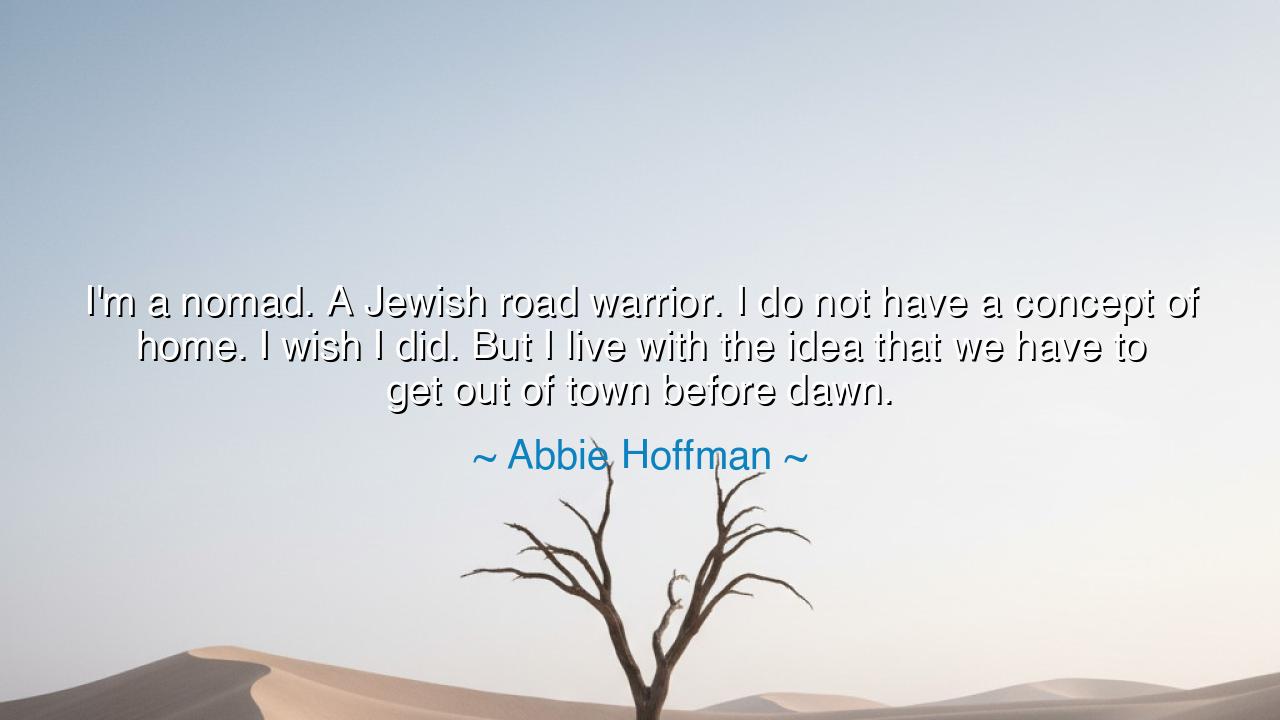
I'm a nomad. A Jewish road warrior. I do not have a concept of
I'm a nomad. A Jewish road warrior. I do not have a concept of home. I wish I did. But I live with the idea that we have to get out of town before dawn.






In the twilight vocabulary of exile, Abbie Hoffman speaks a confession that is half wound, half weather report: “I’m a nomad. A Jewish road warrior. I do not have a concept of home. I wish I did. But I live with the idea that we have to get out of town before dawn.” Hear the cadence: identity, motion, absence, longing, and a dawn-flight drilled into the bones. It is the psychology of a man shaped by protest and pursuit, but also by an older inheritance—the ancestral memory of packing quickly, of travel papers, of doors closed behind you by other people’s fear.
To name oneself a nomad is to admit a map without anchors. In Hoffman’s mouth it is not romance; it is vigilance. A road warrior sleeps with boots near the door, conscience alert to sirens and rumors. The phrase “I do not have a concept of home” is not bravado; it is grief—an acknowledgement that belonging, for some lives, never congeals into an address. When he says, “I wish I did,” the mask slips and we glimpse the ache: even rebels desire a hearth; even fugitives dream of a drawer with their name on it.
Context braids this into history. As a leader among the Yippies and an icon of sixties dissent, Hoffman learned to move—rallies to courtrooms, safe houses to stages. In the mid-1970s he lived underground for years, adopting an alias, surfacing only in careful intervals. “We have to get out of town before dawn” was not metaphor alone; it was logistics. Yet it also echoed an older Jewish script: diaspora, pogrom, the Exodus itself—a people that learned to bake bread without leaven because there was no time to let it rise. For Hoffman, personal tactics intersected with cultural memory; the body’s flight was in step with the story of his people.
A mirror from farther back: the wanderings of Ahasuerus in legend, or the real, relentless migrations of nineteenth- and twentieth-century Jews across borders that treated them like tides. Trunks ready, names altered, children taught to wake fast—habits born of necessity. Hoffman’s line gathers that inheritance and welds it to the counterculture’s improvisation. It is the sentence of a man who has learned that safety can be scheduled but not secured, that love of country can coexist with the craft of departure.
Consider a smaller, modern parable. A young organizer I knew—the child of refugees—kept a “go-bag” beside her desk long after the marches ended. She had keys on two rings, cash in two currencies, scanned documents in the cloud, and a friend in every city who could offer a couch. She laughed at herself, but on anxious nights she slept more easily because the old lesson was honored: be light on your feet; keep your promises portable. Her life was not hunted, but her preparation was an heirloom—practical, inherited wisdom from people who had once left before sunrise.
The meaning, then, is double. Hoffman warns of a society that makes some citizens perpetual travelers—by politics, by prejudice, by their own commitments—and he confesses a longing that never quiets. The nomad is agile, yes, but also lonely. The road warrior is brave, but sometimes tired of armor. The absence of home sharpens humor and strategy, yet it costs tenderness a place to rest. To live alert to dawn departures is to trade depth for survivability—sometimes necessary, often tragic.
What lesson do we pass on? First, honor the ones who must move; do not romanticize their restlessness. Second, build communities that make sudden flight less necessary—laws that protect dissent, neighborhoods that refuse scapegoats, institutions that keep midnight knocks rare. Third, if your life requires motion, practice humane nomadism: cache your care in many places, cultivate reciprocal hospitality, and keep a small altar of continuity—a book, a prayer, a photograph—that turns any room into a temporary home. Finally, if you are rooted, widen your roots into shelter for others: be the porch light that makes someone’s wish less wistful, the friend who says, “You don’t have to get out of town before dawn tonight; stay.” In such exchanges, rebellion becomes reparative, and the ancient ache learns, if not to end, at least to breathe.






AAdministratorAdministrator
Welcome, honored guests. Please leave a comment, we will respond soon